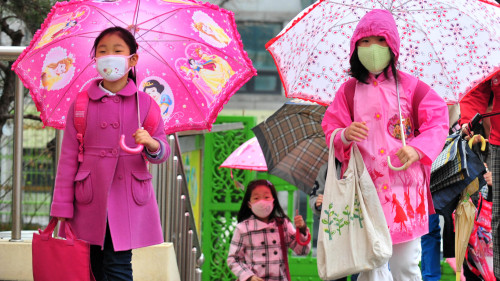A trace amount of radioactive contaminants has been detected in rainwater on Jeju Island off South Korea's southern coast, a state nuclear safety agency said Thursday.
The Korea Institute of Nuclear Safety (KINS) said tests conducted on rainwater that fell in the early morning hours of the day showed minuscule traces of iodine-131, cesium-134 and cesium-137.
Concentration levels of 2.02 becquerels (Bq) per liter of rain were detected for iodine-131, with numbers for cesium-134 and cesium-137 reaching 0.333 Bq and 0.538 Bq, respectively.
"Such levels are so minute that a person can drink 2 liters of such water for an entire year without any health risks," KINS said.
The highest concentration level of 2.02 Bq is equivalent to 0.037 millisievert (mSv), which is far below the 1 mSv safety standard set by the government.
KINS, however, said that though concentration levels were effectively negligible, there was a six-fold increase in iodine-131 in the rain compared to that which fell on the resort island on Monday.
The institute under the Ministry of Science and Technology added that it had expected to find radioactive materials since iodine and cesium particles have been floating in the air for the past three weeks.
"Rain will pick up such particles as they fall from the sky," it said.
KINS has been reporting on daily air samples of radioactive particles across the country since last month, with testing for Jeju being shortened to three hours starting Tuesday after concerns were raised that contaminated air from Japan's stricken Fukushima nuclear power station would reach the island directly.
In the past, Seoul said radioactive particles reached the country after circling the northern hemisphere by following the prevailing westerly winds. Because of the great distance covered, any materials that reach South Korea will be much smaller than those released by the power station.
Related to the discovery of radioactive contaminants in rainwater, local retailers have started to take advantage of consumer worries by advertising products that they claim can help keep people safe from harmful effects of exposure.
Retailers and online shopping malls have been selling various seaweed products, such as kelp, brown seaweed and sea lettuce, which are considered helpful in protecting the body against radioactive particles.
There has also been a rush to market protective masks, umbrellas and rain coats as well as air filters.
 |
Children wearing masks and holding umbrellas go to school on Thursday amid fears that the rain may contain radioactive materials from the crippled nuclear reactors in Japan. (The Korea Herald) |
Japan's contaminated air won't reach Korea: gov't
Chances of radioactive materials from Japan's tsunami-hit nuclear power plant directly reaching South Korea in rain or other forms are slim, the government here said Thursday.
The Japanese government earlier this week gave prior notice to Seoul before infusing nitrogen into a crippled nuclear reactor at the Fukushima power plant, the Seoul government noted.
The Prime Minister's Office made the announcement after the first meeting of an inter-agency task force to coordinate the government's response to Japan's recent discharge of radioactive water into the sea.
Separately, South Korea's environmental authority has been on high alert as fears have spread quickly over the possibility that rain containing traces of radiation from the nuclear power plant could contaminate tap water and soil, officials said Thursday.
The Ministry of Environment earlier this week handed down an emergency order to municipal offices and tap water suppliers throughout the country to put covers over outdoor water purification facilities to protect them from possible radioactive rain.
The operators also have been asked to prepare activated carbon powder necessary to remove radioactive iodine from water just in case and seek help from research institutes to analyze radioactive material if necessary, according to ministry officials.
On Thursday, the Korea Institute of Nuclear Safety, a state think tank, was analyzing soil samples collected early this week from 12 places all over the country to see if they contain traces of radiation.
However, some raised concerns that the environment ministry will be caught off guard if radioactive rain actually falls on the country because it lacks knowhow, experts in the field and immediate access to devices for measuring radiation levels in water and soil.
"We need to approach the radiation issue from an environmental perspective although the Ministry of Education, Science and Technology is the top government office handling the issue," a environment ministry official said on condition of anonymity. "We are not well prepared for the problem since it only happens once every few decades, but we will swiftly handle it."
(Yonhap News)







![[Herald Interview] How Gopizza got big in India](http://res.heraldm.com/phpwas/restmb_idxmake.php?idx=644&simg=/content/image/2024/11/20/20241120050057_0.jpg)